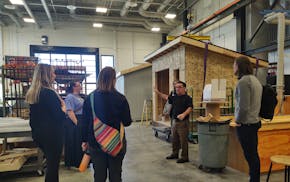ALEXANDRIA, Minn. – Minnesotans know what it's like to cry for a lost department store.
So many have come and gone over the years. Dayton's. Donaldson's. Sears. Filene's Basement.
But there may be no grief like that of a small town for its long-lost Herberger's.
Herberger's was small-town Minnesota's Dayton's.
Six years after Herberger's closed its doors, Alexandria is still mourning its loss. Back in the day, Herberger's would have been swarming with customers on the Black Friday weekend, drawn in by the store's coupons and its array of apparel and gifts.
Alexandria wasn't a huge city, but Herberger's helped make it a real shopping destination for middle-class families who lived within 30 miles or so.
"I miss them, terribly," said Sue Sarberg, a retired school secretary as she walking through the Viking Plaza Mall in Alexandria, which Herberger's once anchored along with JCPenney and Dunham's. Sarberg could count on Herberger's if she needed a nice dress for a wedding or a decent pair of slacks for her husband. You could run in there after work any day of the week.
Now she drives more than an hour each way to shop in St. Cloud, which complicates things if she has to make returns.
This column is not a paean to rampant consumerism. If anything, Herberger's was the opposite of fast fashion. I still wear the black wool peacoat I bought one winter, a pair of brown slacks and a black sweater with a stitched-in black-and-white striped collar. Herberger's clothes lasted and were not so fashion-conscious that they would have to be discarded after one season. They looked nice at work, church, or school. They were modest, warm, reasonably priced. Herberger's was, well, a very Minnesota kind of store. No wonder, given that the chain started here.
In 1889, Frank and George Herberger bought a store in downtown Osakis, according to the Douglas County Historical Society. By the 1930s, there was a Herberger's store in Alexandria, and by the time the chain closed in 2018, there were stores in Albert Lea and Baxter, Mankato and Virginia, as well as in the Twin Cities and about 10 other states.
Herberger's was known for its customer service, and shoppers would often run into employees or shoppers they knew from life outside the store. Its name was clunky and smacked of feminist burger joint, but it was softened by its trademark rose alongside the name.
When she heard it was closing, Vickie Bartz, a seamstress from Glenwood, rushed in to buy $700 worth of her favorite underwear and bras.
"I was so worried I wouldn't be able to find them again," she said. Spoiler alert: she did, at Kohl's, which opened a store in Alexandria earlier this year.
The loss of a department store might be easier to weather in bigger cities with more shopping choices. But at the same time that Herberger's closed, Alexandria also lost JCPenney and several smaller mall stores. Its downtown boutiques took up some of the slack, but at a higher price point, and they were largely aimed at lake home owners and tourists. There was a real shortage of women's work clothes and clothes for kids and men. For five years, Herberger's massive footprint – it occupied 70,000 square feet at the Alexandria mall – sat empty, as did the space vacated by JCPenney. Kohl's took up some of it and T.J. Maxx will take up more when it opens a store there in 2025.
But the thing that strikes me most about small-town Minnesota losing their Herberger's stores is that they were beloved. They were needed. People shopped there. They spent money there. Herberger's closed because its parent company, Bon-Ton, filed for bankruptcy in the wake of shoppers moving their business online. If Herberger's had stayed independent, and not been bought by a big chain, I suspect it would have maintained the customer loyalty in Minnesota to continue operating today. People like to try on their clothes before they buy them. They like to feel the fabric and examine the stitching. A local store is convenient; no waiting for the Amazon box to arrive.
For a while, there was talk that Herberger's would return online. There's even a website that claims, "The store you know and love is coming back — bigger and better than ever!" But it's been there for years and at this point it seems doubtful.
Maybe the days are gone when an enterprising local could build up a retail brick and mortar operation to serve customers in big cities and small. But if big chains continue to let us down, maybe an opportunity will open up.
If it does, there are plenty of eager shoppers willing to spend.

Tolkkinen: Fergus Falls priest who studied with Pope Leo says he has good hearing 'to hear everyone'

Tolkkinen: Just when I was starting to lose myself in nature's grandeur, along came a motorcycle

Tolkkinen: On a three-day northern Minnesota tour, the grit and glory of our state became clear

Tolkkinen: Brainerd City Council should spend a night, or 30, sleeping outdoors


